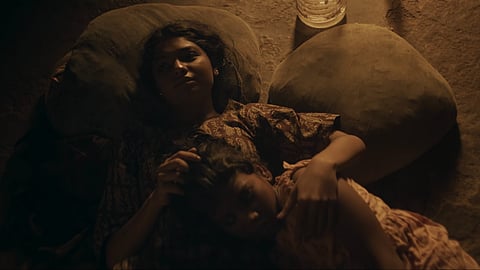
- HOMEGROWN WORLD
- #HGCREATORS
- #HGEXPLORE
- #HGVOICES
- #HGSHOP
- CAREERS
- ABOUT US
- CONTACT US

Stories of an unfamiliar world are best told by the people of that world. 'Anuja' is a mix of two gazes within that world. Anuja, built around the lives of two young, orphaned sisters who work in a garment factory, was nominated in the Best Live Action Short Film category at this year’s Academy Awards. The film’s protagonist, Sajda Pathan, a resident of Delhi’s Yamuna Bazaar slum, is one of the many children supported by the Salaam Balak Trust, which is also associated with the film. The Salaam Balak Trust is a non-profit organization providing support for street and working children, after being established in 1988 by Mira Nair after the release of her film, 'Salaam Bombay!'
The film opens with Palak, played by Ananya Shanbagh narrating a folk story to her sister Anuja (Sajda Pathan). What follows is the lives of these two children in a garment factory with an obnoxious boss, and the privilege of uncomplicated choices, when Anuja is at a crossroads between education and money. There’s a sequence of the two girls doing all that they dreamt of, from watching movies to taking a rickshaw ride, and despite it becoming borderline stereotypical for films like this, it is undeniably sweet. It brings a tiny ray of hope into their lives and ours. Sajda’s role as Anuja is played fantastically.
Palak sneakily stitches bags from leftover fabric at the garment workshop and sells them, to save for her wedding and for Anuja's expenses. Anuja, a math prodigy on the other hand, is approached by an educator, Mr. Mishra (Gulshan Walia), to attend the entrance exam for a boarding school admission. But when Anuja's boss recognizes her talent and offers a job, starting the same day as the exam, Anuja is forced to make a choice. There's this sisterhood throughout the film, that defines Palak and Anuja's relationship, that instantly pulls you in.
Where the film occasionally falls flat is when it plays to audiences’ expectations — the boss is just as mean and selfish as he needs to be, a security guard is just as unexpectedly kind, and Anuja is just as defiant as she should be. Every aspect of the film hangs in the middle and it just feels like they could've pushed the envelope a little more. There are also bits in the film where the fourth wall is broken, with no necessity for it, which feels a little contrived. What the film lacks is the absence of a lived reality in its voice. Its dusty, sunny and mustard-tinted depiction of Delhi, seems like it was created to cater to a Western gaze.
Despite some misteps, Anuja thoughtfully depicts the reality of child labour and privilege in India. The open-ended climax of the film also reinforces a very essential thought — does the weight of our pockets decide the weight of the choices we are forced to make?
The film has been recieved positively across the world, with Mindy Kaling, Guneet Monga, and Priyanka Chopra Jonas serving as producers
Anuja in its essence, is a noble film; a story that needs to be told. It just could've benefitted from a voice and lens that was truer to the reality of both its backdrop and the community it represents.
Anuja is now streaming on Netflix.
